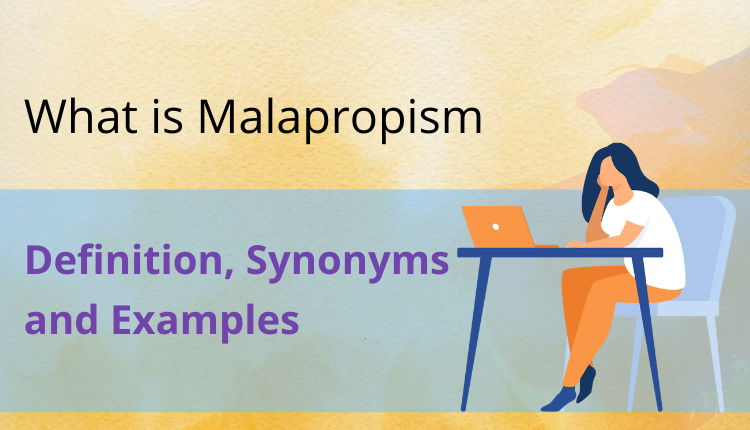Language is such an intriguing and dynamic thing, full of quirks and subtlety. Perhaps the most amusing linguistic error that commonly crops up in speech and writing is malapropism. Intentional or not, malapropisms can result in hilarious miscommunications or even function as a stylistic technique in writing and media. This blog will address what malapropism is, synonyms, its history, examples, and its function in communication.
Definition of Malapropism
Malapropism refers to the incorrect application of a word in place of one with a similar sound, usually bringing about unintentionally humorous consequences. The term comes from the French expression mal à propos, meaning “inappropriate.” An example is using the phrase “Texas has a lot of electrical votes” instead of “electoral votes.”
Synonyms for Malapropism
Though malapropism is the best-known term for this error of speech, there are some synonyms and related expressions, such as:
- Incorrect or improper word use – Misstatement
- Speech error causing unintended meaning – Verbal blunder
- Using a word incorrectly by reason of similarity in sound – Word misuse
- Treating a word in a way that is not accurate, usually metaphorically – Catachresis
Historical Background
Malapropism is named after a character in Richard Brinsley Sheridan’s play, The Rivals, written in 1775. Mrs. Malaprop would often misuse words in her efforts to be more refined, and this would land her in comedic predicaments. Her most famous gaffs include using “illiterate him quite from your memory” instead of “obliterate him quite from your memory.”
Examples of Malapropisms
Malapropisms are prevalent in everyday speeches, books, and public addresses. Here are a couple of famous examples:
- “He is the pineapple of politeness.” (Instead of “pinnacle of politeness.”)
- “Texas has a lot of electrical votes.” (Instead of “electoral votes.”)
- “Our watch has detected some miscalculations.” (Instead of “Our research has detected some miscalculations.”)
Purpose and Effect of Malapropisms
Malapropisms may be used to serve a number of purposes in communication, including:
- Humor: They produce accidental comic effects as a result of the misuse of words.
- Characterization: Authors employ malapropisms to portray characters as ignorant, pretentious, or smug in vocabulary.
- Highlighting Language Complexity: Malapropisms reveal how easily language can be misinterpreted because of phonetic similarity between words.
Common Causes of Malapropisms
Malapropisms commonly result from:
- Phonetic Similarity: Words that sound the same but have distinct meanings, e.g., “specific” and “pacific.”
- Limited Knowledge of Vocabulary: Individuals who are trying to employ complex vocabulary can confuse words.
- Rapid or Hasty Speech: In spontaneous utterance, the mind can unwittingly retrieve an analogous-sounding word.
Discerning Malapropisms from Other Similar Phenomena
Although malapropisms are a unique form of language blunder, they are frequently mistaken for other linguistic errors including:
- Spoonerisms: The switching of sounds within a phrase, such as saying “You have hissed the mystery lectures” rather than “You have missed the history lectures.”
- Eggcorns: Phrases or words which are misheard and reinterpreted, such as “old-timers’ disease” for “Alzheimer’s disease.”
- Freudian Slips: Speech errors that expose underlying thoughts.
Malapropisms in Popular Culture
Malapropisms also tend to creep into everyday popular culture, bringing humor and playfulness to conversation. Players such as the legendary Mrs. Malaprop in Richard Brinsley Sheridan’s play “The Rivals” illustrate how misplaced words can evoke funny situations that will be relatable to audiences.
Television programs and films often employ malapropisms to create humor. Remember characters who boldly use words incorrectly, creating laugh-out-loud moments that depict their idiosyncrasies and make a lasting impression on audiences. Such witty wordplay makes dialogue relatable and memorable.
How Trinka Grammar Checker Can Help
Trinka Grammar Checker is an effective tool that can assist you in detecting malapropisms before they reach your writing. Its sophisticated AI technology picks out improper word usage and recommends proper alternatives. This makes your language precise and clear.
With Trinka, you not only get to write better content but also get better as a writer. The instant feedback enables you to correct quickly, and thus, it becomes a little easier to communicate effectively without the mortifying mistakes.
Conclusion
Malapropisms bring some humor and beauty to language, whether they are used inadvertently in informal conversations or are employed deliberately in media and literature. Knowing malapropisms can enhance communication ability and linguistic sensitivity and give some comic relief. The next time you hear or read a malapropism, appreciate the funny nuances of the English language.

